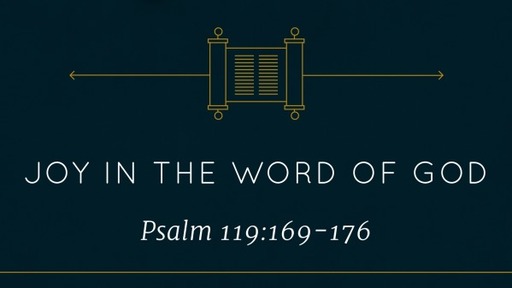Joy in the Word

Text:
Sermon Title:
Thesis:
Introduction:
Ps. 119 As Ps. 117 has the distinction of being the shortest chapter in the Bible, so Ps. 119 is the longest. The psalm is an acrostic of twenty-two stanzas, one for each letter of the Hebrew alphabet. The eight poetic lines of each stanza begin with the same Hebrew letter.
The number eight may be connected with eight Hebrew words that appear throughout the psalm concerning its main theme. The words are translated variously as “law,” “testimonies,” “precepts,” “statutes,” “commandments,” “rules,” and “word.”
In five stanzas all eight Hebrew words occur, and every stanza has at least six of the eight.
Verse 97 is perhaps the theological heart of the psalm, as it expresses the psalmist’s love for God’s law. The psalmist also has a deep desire to live in keeping with this law. Yet the psalmist also recognizes that he has strayed from time to time from the standard set forth in the law. While the emphasis of the psalm is on love for and obedience to the law of God, this is balanced to some degree by an awareness of the need for forgiveness.
The law is a faithful expression of God’s character. God sent His Son to keep the law for us. The law no longer condemns us, setting us free to accept it as our own guide for pleasing the One who died in our place.
The Law (torah) consists mainly of: (1) the historical section of the Pentateuch, which teaches us God’s will from history; (2) the Ten Commandments (Exodus 20:1–17; Deuteronomy 5:1–21), which are clearly treated as the basis of the covenant and of all other law; (3) three commentaries on the Ten Commandments, ie Exodus 20:23–23:33; Leviticus 17:1–26:46; Deuteronomy 12:1–28:68; (4) a long exhortation by Moses, Deuteronomy 1:1–11:32 (excluding 5:1–21); (5) diverse sacrificial and ritual laws, Exodus 25:1–31:18; Leviticus 1:1–16:34, and many chapters in Numbers. The more (3) and (5) are stressed, the easier the law seems to be to keep and the easier one lapses into legalism. The more (1), (2) and (4) are stressed the harder it is seen to be to do God’s will. The former may lead to conviction of sins but hardly of sin. The psalmist gives the impression of being rather delicately poised between the two. He is not a legalist, but how easily he could have become one.
We should always make the word of God the rule of our discourse, so as never to transgress it by sinful speaking, or sinful silence.
